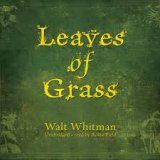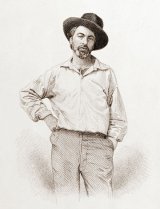Leaves of Grass Page #11
Leaves of Grass is a poetry collection by the American poet Walt Whitman (1819–1892). Although the first edition was published in 1855, Whitman spent most of his professional life writing and re-writing Leaves of Grass, revising it multiple times until his death. This resulted in vastly different editions over four decades—the first, a small book of twelve poems and the last, a compilation of over 400.
and index. I speak the pass-word primeval, I give the sign of democracy, By God! I will accept nothing which all cannot have their counterpart of on the same terms. Through me many long dumb voices, Voices of the interminable generations of prisoners and slaves, Voices of the diseas'd and despairing and of thieves and dwarfs, Voices of cycles of preparation and accretion, And of the threads that connect the stars, and of wombs and of the father-stuff, And of the rights of them the others are down upon, Of the deform'd, trivial, flat, foolish, despised, Fog in the air, beetles rolling balls of dung. Through me forbidden voices, Voices of sexes and lusts, voices veil'd and I remove the veil, Voices indecent by me clarified and transfigur'd. I do not press my fingers across my mouth, I keep as delicate around the bowels as around the head and heart, Copulation is no more rank to me than death is. I believe in the flesh and the appetites, Seeing, hearing, feeling, are miracles, and each part and tag of me is a miracle. Divine am I inside and out, and I make holy whatever I touch or am touch'd from, The scent of these arm-pits aroma finer than prayer, This head more than churches, bibles, and all the creeds. If I worship one thing more than another it shall be the spread of my own body, or any part of it, Translucent mould of me it shall be you! Shaded ledges and rests it shall be you! Firm masculine colter it shall be you! Whatever goes to the tilth of me it shall be you! You my rich blood! your milky stream pale strippings of my life! Breast that presses against other breasts it shall be you! My brain it shall be your occult convolutions! Root of wash'd sweet-flag! timorous pond-snipe! nest of guarded duplicate eggs! it shall be you! Mix'd tussled hay of head, beard, brawn, it shall be you! Trickling sap of maple, fibre of manly wheat, it shall be you! Sun so generous it shall be you! Vapors lighting and shading my face it shall be you! You sweaty brooks and dews it shall be you! Winds whose soft-tickling genitals rub against me it shall be you! Broad muscular fields, branches of live oak, loving lounger in my winding paths, it shall be you! Hands I have taken, face I have kiss'd, mortal I have ever touch'd, it shall be you. I dote on myself, there is that lot of me and all so luscious, Each moment and whatever happens thrills me with joy, I cannot tell how my ankles bend, nor whence the cause of my faintest wish, Nor the cause of the friendship I emit, nor the cause of the friendship I take again. That I walk up my stoop, I pause to consider if it really be, A morning-glory at my window satisfies me more than the metaphysics of books. To behold the day-break! The little light fades the immense and diaphanous shadows, The air tastes good to my palate. Hefts of the moving world at innocent gambols silently rising freshly exuding, Scooting obliquely high and low. Something I cannot see puts upward libidinous prongs, Seas of bright juice suffuse heaven. The earth by the sky staid with, the daily close of their junction, The heav'd challenge from the east that moment over my head, The mocking taunt, See then whether you shall be master! 25 Dazzling and tremendous how quick the sun-rise would kill me, If I could not now and always send sun-rise out of me. We also ascend dazzling and tremendous as the sun, We found our own O my soul in the calm and cool of the daybreak. My voice goes after what my eyes cannot reach, With the twirl of my tongue I encompass worlds and volumes of worlds. Speech is the twin of my vision, it is unequal to measure itself, It provokes me forever, it says sarcastically, Walt you contain enough, why don't you let it out then? Come now I will not be tantalized, you conceive too much of articulation, Do you not know O speech how the buds beneath you are folded? Waiting in gloom, protected by frost, The dirt receding before my prophetical screams, I underlying causes to balance them at last, My knowledge my live parts, it keeping tally with the meaning of all things, Happiness, (which whoever hears me let him or her set out in search of this day.) My final merit I refuse you, I refuse putting from me what I really am, Encompass worlds, but never try to encompass me, I crowd your sleekest and best by simply looking toward you. Writing and talk do not prove me, I carry the plenum of proof and every thing else in my face, With the hush of my lips I wholly confound the skeptic. 26 Now I will do nothing but listen, To accrue what I hear into this song, to let sounds contribute toward it. I hear bravuras of birds, bustle of growing wheat, gossip of flames, clack of sticks cooking my meals, I hear the sound I love, the sound of the human voice, I hear all sounds running together, combined, fused or following, Sounds of the city and sounds out of the city, sounds of the day and night, Talkative young ones to those that like them, the loud laugh of work-people at their meals, The angry base of disjointed friendship, the faint tones of the sick, The judge with hands tight to the desk, his pallid lips pronouncing a death-sentence, The heave'e'yo of stevedores unlading ships by the wharves, the refrain of the anchor-lifters, The ring of alarm-bells, the cry of fire, the whirr of swift-streaking engines and hose-carts with premonitory tinkles and color'd lights, The steam-whistle, the solid roll of the train of approaching cars, The slow march play'd at the head of the association marching two and two, (They go to guard some corpse, the flag-tops are draped with black muslin.) I hear the violoncello, ('tis the young man's heart's complaint,) I hear the key'd cornet, it glides quickly in through my ears, It shakes mad-sweet pangs through my belly and breast. I hear the chorus, it is a grand opera, Ah this indeed is music--this suits me. A tenor large and fresh as the creation fills me, The orbic flex of his mouth is pouring and filling me full. I hear the train'd soprano (what work with hers is this?) The orchestra whirls me wider than Uranus flies, It wrenches such ardors from me I did not know I possess'd them, It sails me, I dab with bare feet, they are lick'd by the indolent waves, I am cut by bitter and angry hail, I lose my breath, Steep'd amid honey'd morphine, my windpipe throttled in fakes of death, At length let up again to feel the puzzle of puzzles, And that we call Being. 27 To be in any form, what is that? (Round and round we go, all of us, and ever come back thither,) If nothing lay more develop'd the quahaug in its callous shell were enough. Mine is no callous shell,
Translation
Translate and read this book in other languages:
Select another language:
- - Select -
- 简体中文 (Chinese - Simplified)
- 繁體中文 (Chinese - Traditional)
- Español (Spanish)
- Esperanto (Esperanto)
- 日本語 (Japanese)
- Português (Portuguese)
- Deutsch (German)
- العربية (Arabic)
- Français (French)
- Русский (Russian)
- ಕನ್ನಡ (Kannada)
- 한국어 (Korean)
- עברית (Hebrew)
- Gaeilge (Irish)
- Українська (Ukrainian)
- اردو (Urdu)
- Magyar (Hungarian)
- मानक हिन्दी (Hindi)
- Indonesia (Indonesian)
- Italiano (Italian)
- தமிழ் (Tamil)
- Türkçe (Turkish)
- తెలుగు (Telugu)
- ภาษาไทย (Thai)
- Tiếng Việt (Vietnamese)
- Čeština (Czech)
- Polski (Polish)
- Bahasa Indonesia (Indonesian)
- Românește (Romanian)
- Nederlands (Dutch)
- Ελληνικά (Greek)
- Latinum (Latin)
- Svenska (Swedish)
- Dansk (Danish)
- Suomi (Finnish)
- فارسی (Persian)
- ייִדיש (Yiddish)
- հայերեն (Armenian)
- Norsk (Norwegian)
- English (English)
Citation
Use the citation below to add this book to your bibliography:
Style:MLAChicagoAPA
"Leaves of Grass Books." Literature.com. STANDS4 LLC, 2024. Web. 23 Dec. 2024. <https://www.literature.com/book/leaves_of_grass_23>.




Discuss this Leaves of Grass book with the community:
Report Comment
We're doing our best to make sure our content is useful, accurate and safe.
If by any chance you spot an inappropriate comment while navigating through our website please use this form to let us know, and we'll take care of it shortly.
Attachment
You need to be logged in to favorite.
Log In